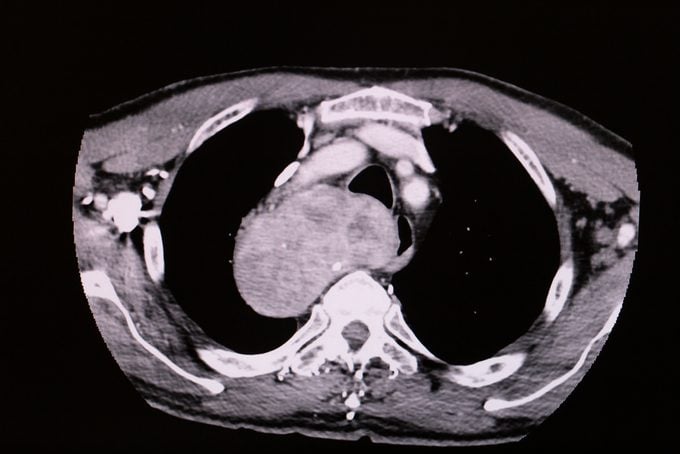What Standard Thyroid Testing Won’t Tell You
Updated: Dec. 17, 2019
Does a "normal" thyroid test mean that everything's normal? Not necessarily. Here's why the go-to test may not uncover what's really going on.
Issues with testing
When your thyroid levels are off, you’re off. That little butterfly-shaped gland at the front of your neck controls your metabolism, your energy level and much more. The TSH test is considered the “gold standard” for diagnosing thyroid health; it measures how much thyroid stimulating hormone (TSH) is in your blood, according to the National Institutes of Health. But there’s one potential hitch: In the last few years, doctors have begun to question what should be considered normal. Previous thinking held that TSH levels should be between 0.5 and 5.0, but some endocrinologists worried that range could include people whose thyroid was not healthy—they might have subclinical or more subtle disorders and still be in the healthy range. The American Association of Clinical Endocrinologists suggested a new normal of 0.3 and 3.0—which then led to worries that doctors would treat people with healthy thyroids. In other words, it’s complicated.
What’s normal for you
Age and your individual makeup also factor into a potential diagnosis. For example, most young adults without thyroid disease have a TSH that falls between 0.4 and 2.5, and studies like this one published in 2016 in Clinical Medical Research, indicate that TSH rises with age, so older patients should be judged on a different set of criteria. Pregnancy also changes the rules. For the health of both mother and baby, TSH levels should not be above 3.0 when you’re expecting, per research published in Thyroid Research. The bottom line: One size doesn’t fit all when it comes to thyroid levels.
Hypothyroidism caused by pituitary dysfunction
Some thyroid issues may actually be caused by the pituitary gland. In secondary hypothyroidism, the pituitary gland fails to release enough thyroid stimulating hormone; as a result, your body’s metabolism and other vital systems slow down, causing fatigue, weight gain, cold intolerance, and thinning hair, among other symptoms. Typically, a pituitary tumor is to blame, according to the UCLA Endocrine Center. Those at highest risk include women over 50 who have a history of pituitary or hypothalamic dysfunction. “In someone with pituitary dysfunction, TSH may be low or ‘normal’ but that won’t reflect a diseased or non-functioning pituitary gland,” explains Minisha Sood, MD, endocrinologist at Lenox Hill Hospital, New York. “When a pituitary disease is suspected, the more appropriate hormone to measure is the free T4 [a type of thyroid hormone] level along with the TSH.” Check out these 13 thyroid facts everyone should know.
Hashimoto’s thyroiditis

Although this condition is the most common cause of hypothyroidism in the United States, people can have it for years without realizing it, according to the U.S. Department of Health and Human Services. In this autoimmune disorder, your body’s defenses mistakenly attack your thyroid, causing symptoms such as fatigue, muscle weakness, weight gain, depression, constipation, fertility problems, and dry, pale skin. “Nearly all patients with Hashimoto’s disease have antibodies against thyroid peroxidase (TPO), an important enzyme in the production of thyroid hormone,…[and] antibodies against thyroglobulin (Tg), the substance from which thyroid hormone is made,” says Dr. Sood. Because TSH tests don’t check for these substances, doctors will recommend more thorough screening if they find an abnormal TSH result or with women who experience miscarriage or infertility.
Thyroid hormone resistance
This is a rare genetic disorder that affects about 1 in every 40,000, says Rashmi S. Mullur, MD, assistant clinical professor of endocrinology, diabetes, and metabolism at the David Geffen School of Medicine at UCLA. “Standard testing typically reveals a normal or slightly elevated TSH. Follow-up testing will also show an elevated T4 and/or T3,” says Dr. Mullur, who is also the associate chief of integrative medicine at the VA Greater Los Angeles Healthcare System. These results will require further evaluation by an endocrinologist, she says. Once other conditions are ruled out, genetic testing can spot mutations in the thyroid hormone receptors. Depending on the type of mutation, says Dr. Mullur, symptoms could include anything from elevated heart rate and mood disturbance to goiter and impaired bone development.
Subclinical hypothyroidism
Minor illnesses of any type are tougher to diagnose, and that’s especially true for subclinical hypothyroidism. Because TSH levels appear to be in the normal range, doctors may disregard your complaints of fatigue or weight gain. According to the New York Times and a study in the New England Journal of Medicine, testing can miss one in four patients with mild thyroid failure. According to Dr. Sood, “some patients with subclinical hypothyroidism may have only vague symptoms—low energy and constipation or dry skin—and these symptoms may also overlap with other conditions such as vitamin deficiencies, iron deficiency and more. Thus, it is difficult to diagnose these patients.” Here are 9 foods thyroid experts avoid—and you should, too.
Elevated TBG levels
Your thyroid hormones need to hitch a ride around your body to do their job. Their preferred mode of transportation is TBG—thyroxine-binding globulin. When the thyroid hormone attaches to TBG, it’s inactive. So when TBG levels rise, that means less active thyroid hormone for your body. While a TSH test will measure the free thyroid levels in the blood—and indicate that they’re normal—elevated TBG could lead to hypothyroidism. Spotting this issue requires a more comprehensive battery of thyroid tests, according to Medscape. Don’t miss these 7 little healthy habits that make your thyroid happy.
Thyroid issues affecting men

While women are eight to ten times more likely to experience thyroid problems, men aren’t completely off the hook. Although men are less likely to get a TSH test; even if they do, a normal result will lead their doctor to look elsewhere for problems, according to U.S. News & World Report. Common symptoms also differ between genders: Women with hypothyroidism often have unexplained weight gain, while men may lose muscle mass and strength. Other male-specific symptoms include erectile dysfunction and low libido, fatigue, decreased testosterone levels, depression, anxiety, and problems thinking clearly, Penn Medicine reports. Doctors may suggest that the issue lies with depression or aging. In addition to requiring a full panel of thyroid assays, some experts recommend the more specialized TRH stimulation test, which shows what’s happening in the body in “real time.”
Non-thyroidal illness
Even if the test indicates trouble with your thyroid, the issue may be something else: “Thyroid function tests can be abnormal in seriously ill patients or in certain conditions such as sudden-onset hepatitis and depression,” says Dr. Sood. “Additionally, some medications affect thyroid function tests, such as steroids (prednisone), furosemide (a commonly used diuretic), anti-seizure medications, NSAIDs, and more.” That’s why, she says, it’s so important for test results to be interpreted by someone with ample experience, who can sift through the result patterns and the possible causes. Dr. Mullur adds that supplements containing the B vitamin biotin—often taken to help stimulate hair and nail growth and boost energy—can provide a false positive in a thyroid test. Make sure you know these 13 silent thyroid symptoms to watch out for.
What to do when your thyroid test is normal—but you’re feeling anything but normal
As with any medical issue, it’s important to be an advocate for yourself. Dr. Mullur suggests having an open conversation with your physician and then following these three steps: Rule out other disorders that can cause similar symptoms; institute mind-body approaches, including meditation and yoga, to ease common symptoms of thyroid disease; and consider repeat TSH testing with a free T4-level test in six to eight weeks. If repeat testing doesn’t turn up anything, it’s unlikely that thyroid disease is the culprit. “The primary difficulty for patients who think they may be suffering from thyroid dysfunction is that the symptoms of thyroid disease, especially primary hypothyroidism, are incredibly non-specific and very common,” she says. “I often reassure these patients that a TSH test is very unlikely to miss true thyroid disease in the general population.” Next, don’t miss these 10 hidden health dangers of a “normal” thyroid.